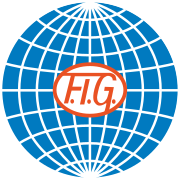International Gymnastics Federation
hideThis article has multiple issues. Please help or discuss these issues on the talk page. (Learn how and when to remove these template messages)
|
 Logo | |
| Abbreviation | FIG |
|---|---|
| Formation | 23 July 1881 |
| Headquarters | Avenue de la Gare 12 |
| Location |
|
Region served | Worldwide |
President | Morinari Watanabe |
| Affiliations | Longines, VTB, Cirque du Soleil |
| Website | www |


The International Gymnastics Federation (French: Fédération Internationale de Gymnastique, FIG) is the governing body of competitive gymnastics. Its headquarters is in Lausanne, Switzerland. It was founded on July 23, 1881, in Liège, Belgium, making it the world's oldest existing international sports organisation.[1] Originally called the European Federation of Gymnastics, it had three member countries—Belgium, France and the Netherlands—until 1921, when non-European countries were admitted and it received its current name.[2]
The federation sets the rules, known as the Code of Points, that regulate how gymnasts' performances are evaluated. Seven gymnastics disciplines are governed by the FIG: artistic gymnastics, further classified as men's artistic gymnastics (MAG) and women's artistic gymnastics (WAG); rhythmic gymnastics (RG); aerobic gymnastics (AER); acrobatic gymnastics (ACRO); trampolining (TRA); Double mini trampoline (DMT), tumbling (TUM) and parkour.
Additionally, the federation is responsible for determining gymnasts' age eligibility to participate in the Olympics.
Organization[]
The main governing bodies of the federation are the president and vice presidents, the Congress held every two years, the Executive Committee, the Council, and technical committees for each of the disciplines.
As of 2019, there were 148 national federations affiliated with FIG, one of which have been suspended, as well as one associated federation, one provisional federation and the following five continental unions:[3]
- European Union of Gymnastics (UEG)
- (PAGU)
- (AGU)
- (UAG)
- (OGU)
Across all disciplines, participation in FIG sanctioned events exceeds 30,000 athletes, about 70% of whom are female.[4]
Presidents, and their tenures, of the FIG[]
- (1881–1924)[5]
- (1924-1933)[5]
- (1933-1939)[5]
- Count Félix Goblet d'Alviella (1946-1956)[5]
- (1956-1966)[5]
- (1966-1976)[5]
- Yuri Titov (1976-1996)[5]
- Bruno Grandi (1996-2016)
- Morinari Watanabe (2016-present)
Morinari Watanabe was elected president of the organization in 2016.[6]
Competitions[]
According to the technical regulations of the International Gymnastcs Federation,[7] the competitions officially organized by FIG are:
- World Gymnastics Championships
- World Artistic Gymnastics Championships
- World Rhythmic Gymnastics Championships
- Trampoline and Tumbling World Championships
- Aerobic Gymnastics World Championships
- World Acrobatic Gymnastics Championships
- World Cup series
- Artistic Gymnastics World Cup
- Rhythmic Gymnastics World Cup
- Trampoline World Cup
- Acrobatic Gymnastics World Cup
- Aerobic Gymnastics World Cup
- Parkour World Cup
- World Challenge Cup series
- Artistic Gymnastics World Challenge Cup
- Rhythmic Gymnastics World Challenge Cup
Other official FIG competitions include:
- Olympic Games
- Youth Olympic Games
- World Games
- Junior World Gymnastics Championships
- Junior World Artistic Gymnastics Championships
- Junior World Rhythmic Gymnastics Championships
- World Age Group Competitions
Defunct events formerly organized of sanctioned by FIG:
- Four Continents Gymnastics Championships[8][9]
- Junior World Acrobatic Gymnastics Championships[10][11]
- Olympic Games Test Events[12][13]
Age eligibility rules[]
The FIG regulates the age at which gymnasts are allowed to participate in senior-level competitions. The purpose is to protect young gymnasts, but it has caused some controversy, and there have been cases of age falsification.[14]
See also[]
References[]
- ^ "Today in Francophone History". About.com. Archived from the original on 2008-10-05. Retrieved 2008-08-21.
- ^ "Fédération Internationale de Gymnastique / History / Milestones". FIG. Retrieved 2018-07-06.
- ^ "Fédération Internationale de Gymnastique". FIG. Retrieved 2018-07-27. (This page includes a search form that returns results for continental unions, affiliated federations, associated federations, or provisional federations.)
- ^ "FIG - About / Population". FIG. Retrieved 2018-07-05.
- ^ Jump up to: a b c d e f g Huguenin, Andre. 100 Years of the International Gymnastics Federation: 1881-1981 (PDF). Translated by Unger, Beatrice. International Gymnastics Federation. p. 125.
- ^ "Watanabe elected as president of International Gymnastics Federation". Japan Times. Oct 19, 2016. Retrieved 2018-07-05.
- ^ "Technical Regulations 2018" (PDF). FIG. Archived from the original (PDF) on February 28, 2018. Retrieved March 1, 2018.
- ^ "FIG - RG competitions". Archived from the original on 2000-12-06. Retrieved 2020-01-24.
- ^ "FIG - Four Continents". Archived from the original on 2000-12-06. Retrieved 2020-01-24.
- ^ FIG - Sports Acrobatics
- ^ FIG - 1999 Junior World Championships
- ^ FIG 2015 Technical Regulations
- ^ Rio 2016 qualification system
- ^ Elliot, Sarah. "Why Is There an Age Limit for Gymnasts in the Olympics?". LIVESTRONG.COM. Retrieved 2017-05-30.
External links[]
- International Gymnastics Federation
- Gymnastics organizations
- International sports bodies based in Switzerland
- Organisations based in Lausanne
- Sports organizations established in 1881
- 1881 establishments in Belgium

